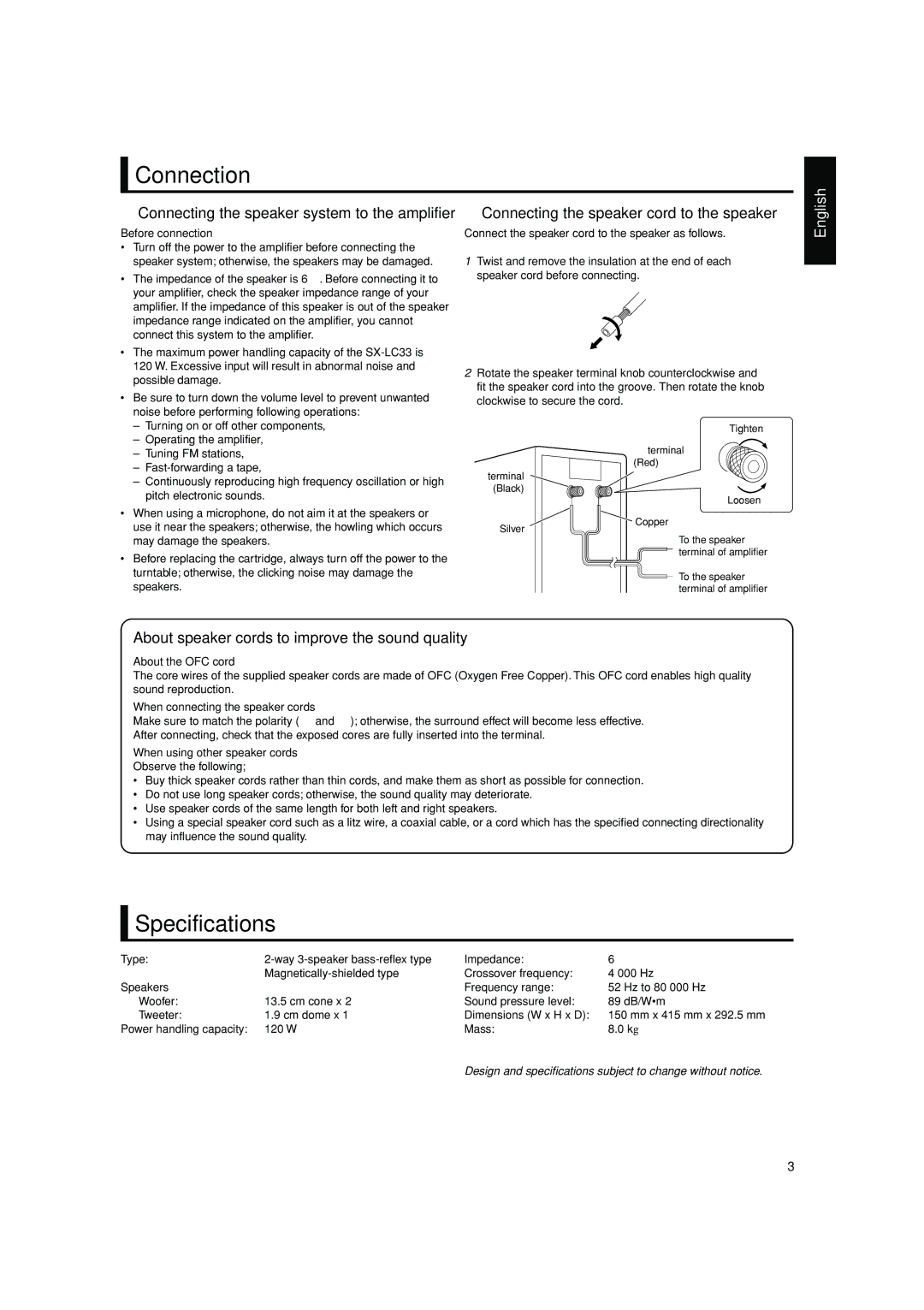
 Connection
Connection
7Connecting the speaker system to the amplifier
Before connection—
• Turn off the power to the amplifier before connecting the |
speaker system; otherwise, the speakers may be damaged. |
• The impedance of the speaker is 6 Ω. Before connecting it to |
your amplifier, check the speaker impedance range of your |
amplifier. If the impedance of this speaker is out of the speaker |
impedance range indicated on the amplifier, you cannot |
connect this system to the amplifier. |
• The maximum power handling capacity of the |
120 W. Excessive input will result in abnormal noise and |
possible damage. |
• Be sure to turn down the volume level to prevent unwanted |
noise before performing following operations: |
7Connecting the speaker cord to the speaker
Connect the speaker cord to the speaker as follows.
1Twist and remove the insulation at the end of each speaker cord before connecting.
2Rotate the speaker terminal knob counterclockwise and fit the speaker cord into the groove. Then rotate the knob clockwise to secure the cord.
English
– Turning on or off other components, | |
– | Operating the amplifier, |
– Tuning FM stations, | |
– | |
– | Continuously reproducing high frequency oscillation or high |
| pitch electronic sounds. |
• When using a microphone, do not aim it at the speakers or | |
use it near the speakers; otherwise, the howling which occurs | |
may damage the speakers. | |
• Before replacing the cartridge, always turn off the power to the | |
turntable; otherwise, the clicking noise may damage the | |
speakers. | |
·terminal
(Black)
Silver
Tighten
ª terminal (Red)
Loosen
![]() Copper
Copper
To the speaker ª terminal of amplifier
To the speaker · terminal of amplifier
About speaker cords—to improve the sound quality
About the OFC cord
The core wires of the supplied speaker cords are made of OFC (Oxygen Free Copper). This OFC cord enables high quality sound reproduction.
When connecting the speaker cords
Make sure to match the polarity (ª and ·); otherwise, the surround effect will become less effective. After connecting, check that the exposed cores are fully inserted into the terminal.
When using other speaker cords
Observe the following;
•Buy thick speaker cords rather than thin cords, and make them as short as possible for connection.
•Do not use long speaker cords; otherwise, the sound quality may deteriorate.
•Use speaker cords of the same length for both left and right speakers.
•Using a special speaker cord such as a litz wire, a coaxial cable, or a cord which has the specified connecting directionality may influence the sound quality.
 Specifications
Specifications
Type: | Impedance: | 6 Ω | |
| Crossover frequency: | 4 000 Hz | |
Speakers |
| Frequency range: | 52 Hz to 80 000 Hz |
Woofer: | 13.5 cm cone x 2 | Sound pressure level: | 89 dB/W•m |
Tweeter: | 1.9 cm dome x 1 | Dimensions (W x H x D): | 150 mm x 415 mm x 292.5 mm |
Power handling capacity: 120 W | Mass: | 8.0 kg | |
Design and specifications subject to change without notice.
3
